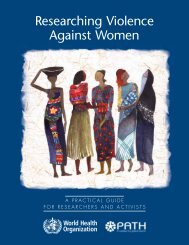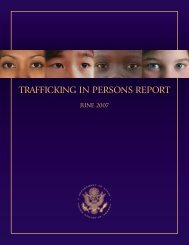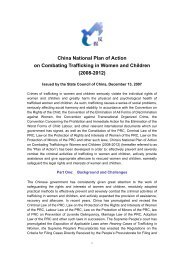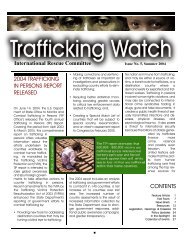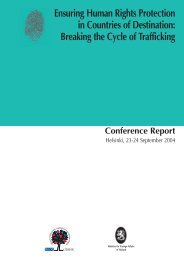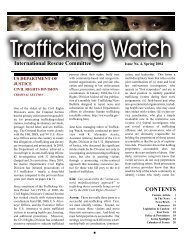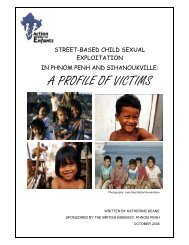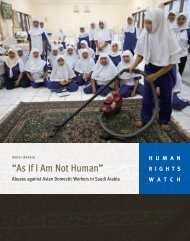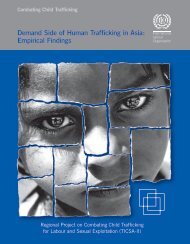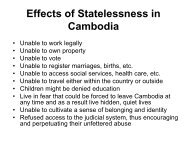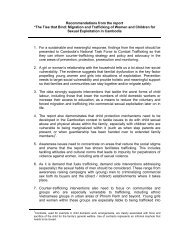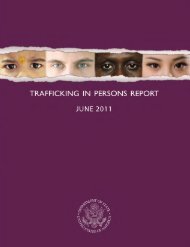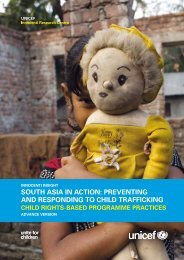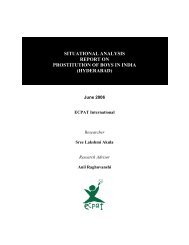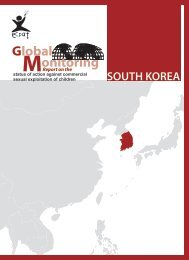Download PDF - Violence Against Children - East Asia and the ...
Download PDF - Violence Against Children - East Asia and the ...
Download PDF - Violence Against Children - East Asia and the ...
Create successful ePaper yourself
Turn your PDF publications into a flip-book with our unique Google optimized e-Paper software.
introduction<br />
Because we are ab<strong>and</strong>oned on <strong>the</strong> streets<br />
And you own all <strong>the</strong> shade…<br />
Because we endure floods<br />
And you party on pleasure boats …<br />
So we don’t like you.<br />
Because we are silenced<br />
And you never stop nagging…<br />
Because we are threatened<br />
And you use violence against us…<br />
So we say to you No.<br />
Because we may not choose<br />
And you are free to make plans…<br />
Because we only have s<strong>and</strong>als<br />
And you are free to use rifles<br />
Because we must be polite<br />
And you have jails<br />
So No <strong>and</strong> No to you.<br />
Because we are <strong>the</strong> current of <strong>the</strong> river<br />
And you are <strong>the</strong> stones without heart …<br />
So <strong>the</strong> water will erode away <strong>the</strong> stones.<br />
– W S Rendra, Indonesia 29<br />
In Indonesia, Sri Lanka <strong>and</strong> parts of <strong>the</strong><br />
Philippines, tensions <strong>and</strong> attitudes affect children.<br />
Work in-community can assist in reducing cause<br />
for hatred, but influence is also needed with<br />
systems <strong>and</strong> government. Structures that don’t<br />
offer protection or that contribute to recurring<br />
difficulties can be reviewed if political will to<br />
acknowledge <strong>the</strong> problem can be generated.<br />
Freedom from exploitation is upheld through<br />
such international instruments as <strong>the</strong> Convention<br />
on <strong>the</strong> Rights of <strong>the</strong> Child (CRC) <strong>and</strong> <strong>the</strong> Universal<br />
Declaration of Human Rights. Child exploitation<br />
that crosses borders requires international<br />
cooperation among law enforcement agencies.<br />
While this is now more possible through extraterritorial<br />
legislation, gaps in capacity <strong>and</strong> differing<br />
legal systems are barriers to due process.<br />
Countries where rule of law is strong have<br />
mechanisms to address such crimes. These<br />
include not only <strong>the</strong> legal system but also<br />
medical <strong>and</strong> human services. Public debate<br />
enables views to be expressed, police, judiciary<br />
<strong>and</strong> government held to account, <strong>and</strong> <strong>the</strong> need<br />
for change discussed. Change is possible through<br />
mechanisms of good governance <strong>and</strong><br />
appropriate resources accompanying<br />
commitment. Developing countries do not have<br />
<strong>the</strong> same level of capacity or resources <strong>and</strong> face<br />
many barriers in achieving freedom for children<br />
from <strong>the</strong> violence of sexual exploitation <strong>and</strong><br />
trafficking. It is here where <strong>the</strong> scale <strong>and</strong> nature<br />
of exploitation remains unacceptably high.<br />
It is in this context that outcome-focused<br />
partnerships <strong>and</strong> networks can be a substantial<br />
resource in promoting positive change for<br />
children. The CAN study recommended<br />
proactive approaches to develop clear internal<br />
policy/procedures that act on cases of child abuse<br />
<strong>and</strong> neglect. World Vision Cambodia has worked<br />
in partnership to build government capacity to<br />
reduce <strong>the</strong> risk children face of trafficking <strong>and</strong><br />
sexual exploitation. Again, a table from Allan<br />
Fowler’s book Striking a Balance summarises <strong>the</strong><br />
intention of <strong>the</strong> approach:<br />
Table 3. Concepts of capacity growth 30<br />
Means<br />
Process<br />
Ends<br />
Capacity growth of civil<br />
society <strong>and</strong> government<br />
institution<br />
Improves <strong>the</strong> ability of<br />
primary stakeholders to<br />
identify <strong>and</strong> carry out<br />
activities to solve problems<br />
Enables <strong>and</strong> stimulates<br />
stronger civic interactions<br />
<strong>and</strong> communication, <strong>and</strong><br />
conflict mediation <strong>and</strong><br />
resolution in society, <strong>the</strong>reby<br />
enhancing social capital<br />
Increases ability of primary<br />
stakeholders to engage with<br />
<strong>and</strong> influence <strong>the</strong> political<br />
arena <strong>and</strong> socio-economic<br />
system in accordance with<br />
<strong>the</strong>ir interests<br />
29 Rendra, W S, "Poem of an Angry Man", from Your Will Be Done, Youthdesk, Indonesia, 1984 (as appears in Takenaka, M & O’Grady, R, The Bible Through<br />
<strong>Asia</strong>n Eyes, Pace Publishing in association with <strong>Asia</strong>n Christian Art Association, New Zeal<strong>and</strong>, 1991)<br />
30 Fowler, A, Striking a Balance, 1997(8)<br />
22



